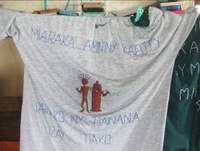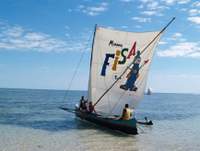Interview: Becks in Madagascar

Through The Road, I met Becks Hill, a nurse from England who was enthusiastic about a development and awareness project she did in Madagascar.
I decided to interview her to know more on what got her into development work, what drove her.
Please meet Becks. Nurse and development worker...
Q: Where you are from, what you did you study?
Becks: I live in Shoreham-by-Sea, West Sussex, England. I studied BSC Nursing Studies in nearby Brighton. . Last year 2007, I completed a Diploma in Tropical Nursing.
Q: How did you get into development? What was behind it, what was the actual trigger?
Becks: My childhood was colourful and both my parents had been involved in various development projects, paving the way for for my future aspirations. On deciding to do my nurse training, I knew then that I wanted to work in development.
Despite my "late arrival" to a formal education in health care, I guess my childhood influences had infiltrated me and I felt compelled to make my mark in some way.
However, it was a longtime coming before I really got my teeth into something I felt truly worthwhile.
Q: How so?
Becks: After finishing my nursing studies, I found myself in a relationship and bound by a different sort of project. My partner and I at the time, had decided on building our own home, in the form of a houseboat. A different sort of challenge: we lived in an old ammunition 70ft barge, bought it in 2004 and a long road followed before its completion into a habitable home.
Working, living and building in one's own home and living on a shoestring had its own challenges but always knowing that a life living and working on a building site, really wasn't my calling and a whole world was still awaiting to be reached.
Q: From a houseboat in England to Madagascar... Quite a change!
Becks: Well, the relationship ended. I set about to finish the boat building and attend the course I had always wanted to: the Tropical Nursing.
This rekindled my thirst to get "out there" and follow the path that I had set out to do, years previously.
Tropical nursing is an amazing and insightful course. It continually provided me with inspiration in the world of development and aid work.
Q: So when did you take "the big step"?
Becks: After finishing the course and not quite feeling like the young spring chicken, that I once was, the idea of working in desperate and worn torn zones of the world was somewhat daunting. But I was on the course I had long dreamt for and scared of where it might take me.
I attended an interview with a well reputed aid agency and disregarded them for being gung-ho and -dare I say- slightly militant. Scouting the Internet, I then found Blue Ventures: A conservation group based in remote South West Madagascar.
There began a dream come true; working in conservation but with a health element: I took on the role of expedition medic for an ever developing conservation NGO.
Q: What projects do you do? What does your work consist of?
Becks: My primary role was to fulfil a duty of care to the expedition staff members, their family's and expedition volunteers. An involved role due to the remoteness of its location. It was a diving operation with the nearest hyperbaric chamber being in South Africa. The nearest health facility was some 50km away over treacherous terrain. My role carried with it some considerable responsibility.
In addition to expedition duties, I had the privilege of managing and running a family planning clinic in the village in which we were based.
Q: And this is where your passion really came out?
Becks: Mmm, prior to my departure for Madagascar, I knew there was high prevalence of STI's (Sexually Transmitted Infections). I knew that a state of emergency had been declared in Port Dauphin in 2007, due to the high incidence of syphilis. I knew that there were issues concerning sexual health. I did my homework and naively hoped that I might be able to influence and help bring about some change when I got there.
I had ideas and I had hope in my heart. "Hope" as there was no war. There was no conflict in Madagascar. This, I believed, was an element of hope, that somehow did not exist with employment with many other NGO's.
Q: So you started off your social project on your own, as a "by-product" to your assistance to the Blue Venture expeditioners?
Becks: I was of course my own to begin with. I worked with conservationists, not health care workers. It soon became apparent to me, that given the high incidence of STI's nationally, the fact that oil had been struck in the country, with the consequence of an influx of migrant workers from South Africa, an HIV epidemic was a time bomb awaiting to happen.
Q: And you wanted to do something about it... Becks: Yes. I set about a slow and tentative campaign. It started with meetings in the village to discern sexual beliefs and practices. Many false beliefs were revealed from these meetings regarding the transmission of STI's and HIV, as were the huge knowledge deficits in this area.
Becks: Yes. I set about a slow and tentative campaign. It started with meetings in the village to discern sexual beliefs and practices. Many false beliefs were revealed from these meetings regarding the transmission of STI's and HIV, as were the huge knowledge deficits in this area.
The meetings and numerous discussions compounded my belief that action needed to be taken, and it needed to be taken yesterday.
It also became clear that condoms were barely used despite sexual promiscuity being the norm. From the research I had done, all HIV awareness programmes needed to be upscaled. Interesting concept in the village of Andavadoaka, where no such programme was even in existence.
Q: So you needed to educate people on STI's, HIV, sexual health. How did you bring that message across? With presentations?
Becks: This is the real interesting bit. We had the idea of using theatre as a medium to convey difficult subjects. That was paramount in my mind. Having managed to de-sensitise the subject over the first four monthes, I then wrote a play and delivered, with the help of expedition volunteers, the first STI/HIV awareness theatre piece in the region.
It was a success.
So, I did it again and then advertised in the village for a STI/HIV awareness theatre competition. The first competition left me in awe and two days before I left the village I held another one. The results were extraordinary, the actors/actresses from the village had taken complete ownership of the raising awareness programme and delivered incredibly detailed and fantastically choreographed pieces, with the first songs beautifully sung about condoms.
Important messages had clearly filtered through with a large audience comprised of all members of the village.
Q: How did that feel?
Becks: Never in my wildest dreams did I imagine such an amazing outcome. From the outset, it seemed an uphill struggle, with the subjects causing much embarrassment and in just six months, knowledge deficits had been bridged and the uptake of condoms increased exponentially. Impact, clearly had been made.
Q: What are the challenges now?
Becks: The programme worked. The problem now is to keep the momentum up and to reach a wider audience. Blue Ventures works with 26 villages in the area. The aim is to take the programme to these villages. The main obstacle, however, is getting the funds to continue the work.
Q: Let me get this straight: were you paid for this work, or was it work as a volunteer?
Becks: The job is essentially unpaid. I did receive a nominal wage 6-weekly. My board and lodging was covered and I learnt to dive for free. My main job is still my work as a nurse in the UK.
Since my return to England in August, I have worked almost full time as a volunteer on the project.
Q: What drives you to do this work. Even more so: to do it unpaid? Becks: I am driven by the incredible response by the people of Andavadoaka to the theatre competitions. Armed with the appropriate information and education surrounding STI's/HIV, I firmly believe that a prevention movement could be brought about and a HIV epidemic could be avoided.
Becks: I am driven by the incredible response by the people of Andavadoaka to the theatre competitions. Armed with the appropriate information and education surrounding STI's/HIV, I firmly believe that a prevention movement could be brought about and a HIV epidemic could be avoided.
With that belief I am driven more strongly than I have ever been before to help bring this about.
Due to the remoteness of the area, national STI/HIV awareness programmes are not reaching the villages around Andavadoaka. The main challenge I face now is raising sufficient interest here in England in order to get the funding to continue with the project.
I am wearing a plethora of interesting hats in order to do this.I am organising a fundraising auction for the project and as I mentioned before, I am writing a proposal for prosepctive funders.
Q: You work on a grass roots project, clearly. Do you ever get demotivated if
you look at the scale of issues developing countries are faced with? E.g.
you work on STI/HIV awareness, but this issue has now such a gigantic proportion and impact?
Becks: Do I get de-motivated by the scale of the problem? As said, a huge impact was made in just 6 monthes. I can only imagine great things could be brought about with adequate funding and resources.
I firmly believe there remains hope in Madagascar: it is not afflicted by war. HIV has not as yet taken root, it has not reached the epidemic proportions that have reached other parts of the world. That is a motivator, far from being a de-
motivator.
Q: What would you give as advice to others who 'are thinking of making the step' to get involved in aid or development projects?
Becks: Advice to others? I can only say that this life just isn't a test run. If you've got an idea and you think it's a good one, you better get on and do it, because who knows what tomorrow will bring.
Thanks for the inspiration, Becks!
Here is a video about her project:
Read more about Blue Ventures family planning projects. You can also donate to their activities
Articles mentioning Beck's project, you can find People and Planet and IRIN
 Peter. Flemish, European, aid worker, expeditioner, sailor, traveller, husband, father, friend, nutcase. Not necessarily in that order.
Peter. Flemish, European, aid worker, expeditioner, sailor, traveller, husband, father, friend, nutcase. Not necessarily in that order.
1 comments:
To find out more about the project contact becky(at)blueventures.org
Post a Comment